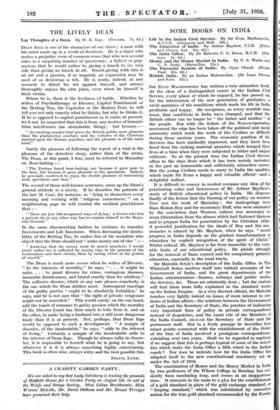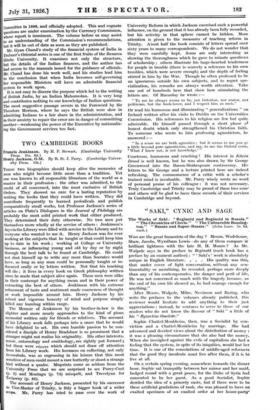SOME BOOKS ON 'INDIA
SIR EVAN MACHONOCHIE has written a very attractive book. 1
At the close of a distinguished career in the Indian Civil t Service, every phase of which he enjoyed, he has passed on, for the information of the new generation of graduates, a vivid narrative of the conditions which made his life in India profitable and happy. He recognizes, as every sensible man must, that conditions in India have changed, and that the British officer can no longer be " the father and mother " of the people. But with the failure of the Non-co-operation movement the edge has been taken off the political and racial animosity which made the work of the Civilian so difficult during those anxious years. The economic position of the Services has been markedly improved, and they have been freed from the carking material anxieties which warped their lives at a time when they were subjected to bitter and unjust criticism. So at the present time the Indian Civil Service offers to the class from which it has been mainly recruited in the past an honourable and sufficiently attractive career. But the young Civilian needs to carry to India the qualities which made Sir Evan a happy and valuable official—and a delightful author.
It is difficult to convey in modest compass any idea of the penetrating value and incisiveness of Mr. Arthur Mayhew's study of British educational policy in India. He disposes finally of the fiction that the framing of our policy on western lines was the work of Macaulay ; the mainsprings were Ram Mohun Roy and the missionary Duff, who were animated by the conviction that Western culture was necessary to wean Orientalism from 'the abuses which had fastened thereon and to prepare India for penetration by the Christian ethic. A powerfid justification for the ideals of Roy and the mis- sionaries is educed by Mr. Mayhew, when he says " moral progress in India depends on the gradual transformation of education by explicit recognition of the spirit of Christ." Whilst critical, Mr. Mayhew is far from insensible to the valu- able fruits of our educational policy. He pleads strongly for the removal of State control and for compulsory primary education, especially in the rural tracts.
Sir Malcolm Seton's description of the India Office in The Whitehall Series resolves itself into tabloid accounts of the Government of India, and the great departments of the Indian administration—finance, railways and public works, the Services, &c. These are admirably done ; but the curious will find them more fully explained in the standard works on the Indian Empire. As a very discreet official, Sir Malcolm touches very lightly indeed on issues of more interest to stu- dents of Indian affairs—the relations between the Government of India and the Secretary of State, the practice of indicating very important lines of policy in private correspondence instead of despatches, and the exact role of the Members of the India Council, vis-a-vis the Secretary of State and the permanent staff. But in a lively passage he describes how minor points connected with the establishment of the Order of the Star of India involved a prodigious correspondence, extending over two years. Shall we be regarded as captious if we suggest that this is perhaps typical of some of the activi- ties which make the India Office a fifth wheel in the Indian coach ? Nor does he indicate how far the India. Office has. adapted itself to the new constitutional machinery set up under the Act of 1919.
The examination of Money and the Money Market in India by two professors of the. Wilson College in Bombay has evi- dently been incubating long, and comes at an inopportune time. It amounts in the main to a plea for the establishment of a gold standard in place of the gold exchange standard, or " limping standard," which was substituted by executive action for the true gold standard recommended by the Fowler Committee in 1899, and officially adopted. This and cognate questions are under examination by the Currency Commission, whose report is imminent. The volume before us may assist to an understanding of the Commission's recommendations, but it will be out of date as soon as they are published.
Gyan Chand's study of the financial system of India in Trubner's Oriental series is one of the first fruits of the Benares klindu University. It examines not only the structure, but the details of the Indian finances, and the author has had access to the manuals issued for the guidance of officials. Mr. Chand has done his work well, and his studies lead him to the conclusion that when India becomes self-governing her responsible Ministers will have an admirable financial system to work upon. It is not easy to discern the purpose which led to the writing of British India, by an Indian Mahomedan. It is very long and contributes nothing to our knowledge of Indian questions. The most suggestive passage occurs in the Foreword by Sir Theodore Morison, where he says the British were slow in admitting Indians to a fair share in the administration, and in their anxiety to repair the error are in danger of committing another—weakening the power of the Executive by nationaliz- ing the Government services too fast.



































 Previous page
Previous page